|
|
|
Sort Order |
|
|
|
Items / Page
|
|
|
|
|
|
|
| Srl | Item |
| 1 |
ID:
106770


|
|
|
|
|
| Publication |
2011.
|
| Summary/Abstract |
This article examines the post-Cold War transformation of defence industries in six East-Central European (ECE) countries, all former members of the Warsaw Pact and now members of the European Union and NATO. In the past, the arms industry was one of the pillars of the region's economic and political systems. In the past twenty years the region has gone through a profound transformation that brought fundamental changes in its defence industry. After painful adjustment a renewed arms sector, which is partially integrated into today's global arms production system, emerged. Although its size and prominence declined everywhere, this comparison reveals two distinct regional models, illustrated here by the Polish and Hungarian experiences. In Poland and similar countries the crucial importance of the defence industry was confirmed, whereas in Hungary and similar countries the industry's role has eroded. The ECE experience highlights the crucial role that defence industrial policy still plays in the sector's development. But the article also concludes that arms industry policy is not a suitable tool for national economic policy or management of economic crises.
|
|
|
|
|
|
|
|
|
|
|
|
|
|
|
|
| 2 |
ID:
106769
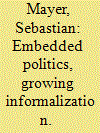

|
|
|
|
|
| Publication |
2011.
|
| Summary/Abstract |
This article investigates changes in the ways NATO and EU states have pursued security since the end of the Cold War, and the repercussions for the state monopoly of external force. Both organizations have autonomous roles, security identities and norm-shaping abilities, making them more consequential than is often acknowledged. Using the analytical concept of internationalization - the increasing importance of political or administrative authorities beyond the nation-state - this article scrutinizes the institutionalization of new functions, mechanisms and operational roles within NATO and the EU's Common Foreign and Security Policy. The resulting process of internationalization can be labelled embedded security politics, a political order characterized by fragmented responsibilities in which underlying national preferences are altered by transgovernmental and transnational contacts and pressure to reach consensus, by thicker institutional structures of rules and common practices that constrain national decision-making, and by schemes that subject national capabilities for autonomous action to institutional and physical constraints. The desirable degree of internationalization is still contested among capitals. There are also unspecific signs of an informalization of decision-shaping or -making: governments use ad hoc networks outside the treaty-based international organizations, allowing more freedom with regard to the interpretation of institutional obligations. The article concludes that internationalization and informalization have more in common than is often admitted, with fundamental implications for the future of national action and security cooperation.
|
|
|
|
|
|
|
|
|
|
|
|
|
|
|
|
| 3 |
ID:
106768
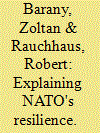

|
|
|
|
|
| Publication |
2011.
|
| Summary/Abstract |
Over the past two decades, NATO's membership and mission have expanded. Practitioners and scholars have extensively debated the pros and cons of the changes, but few have sought to explain why the alliance is so resilient. This paper directly asks and answers the question: Why has NATO mission and membership expanded since the end of the Cold War? Three leading approaches of international relations are used to answer this question. The empirical analysis finds that in isolation, none of the theories perform well at predicting or explaining NATO's adaptation to the post-Cold War environment. However, when combined, they do offer a coherent explanation for the alliance's enlargement and the development of out-of-area operations.
|
|
|
|
|
|
|
|
|
|
|
|
|
|
|
|
| 4 |
ID:
106772
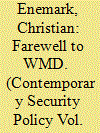

|
|
|
|
|
| Publication |
2011.
|
| Summary/Abstract |
This article critically assesses the ongoing use of the term 'weapons of mass destruction' (WMD) in policy and academic discourse. Nuclear, biological and chemical weapons are commonly lumped together as WMD, but such conflation is misleading from a technological viewpoint and renders the term vulnerable to political manipulation. There are important scientific and strategic differences between weapon types, and glossing over these leads to confusion in accurately assessing and effectively addressing threats of mass destruction. WMD-based language obscures the paramount threat of nuclear weapons, exaggerates the destructive power of chemical weapons, and is unhelpful or counterproductive when used in the context of biological weapons. In the areas of deterrence, defence, and non-proliferation, WMD-based language can mischaracterize the challenges that are uniquely associated with each weapon type, and this potentially generates adverse security consequences flowing from the implementation of inadequate or misdirected countermeasures. The article concludes that it would be both desirable and feasible to abandon the term 'WMD'.
|
|
|
|
|
|
|
|
|
|
|
|
|
|
|
|
| 5 |
ID:
106771
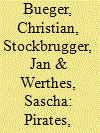

|
|
|
|
|
| Publication |
2011.
|
| Summary/Abstract |
The dominant approach to counter-piracy strategy off Somalia is astonishingly narrow-minded. Deterrence, surveillance and military operations do not provide sustainable or efficient solutions; better strategic alternatives must draw on the lessons of 21st-century peace operations. This perspective leads to an understanding of counterpiracy as a problem of peacebuilding. This allows restructuring and reframing of the problem to permit a much wider repertoire of policy solutions than is currently conceived. This repertoire may include development and security assistance programmes as well as state-building programmes. The approach also permits integration of lessons learned in the frame of international peacebuilding operations, including avoiding technocratic solutions, focusing on power constellations, integrating local knowledge and incrementalism. If the international community wishes to take piracy seriously and respond to its complexities, it would be well advised to adopt a policy in which such alternatives are considered.
|
|
|
|
|
|
|
|
|
|
|
|
|
|
|
|
| 6 |
ID:
106774


|
|
|
|
|
| Publication |
2011.
|
| Summary/Abstract |
Contrasting the nuclear guidance documents and public statements of the George W. Bush and Barack Obama administrations reveals significant differences in American nuclear policy, but also surprising continuities. Bush's aim was never disarmament, but rather extending the life and potential role of American nuclear weaponry. An evaluation of the guidance documents that developed this approach, and major development programmes like the Reliable Replacement Warhead, shows that the Bush strategy was an attempted quiet revolution that foreshadowed a new nuclear era in which the former 'weapon of last resort' became a usable and necessary war-fighting device.
In contrast, Barack Obama promised significant changes in American nuclear policy. In his April 2009 speech in Prague, Obama offered a vision of a transformed international security context and the goal of total nuclear disarmament. Although he made eventual nuclear disarmament the central goal of American nuclear weapons policy, Obama stopped short of change on critical issues that have lingered since the Cold War. A moderate NPR and New START Treaty, together with pragmatic developments at the Nuclear Security Summit and the 2010 NPT Review Conference, as well as on the Comprehensive Test Ban Treaty, indicate that the role of nuclear weapons in American security policy has changed less than is widely assumed. Obama has pursued a policy of nuclear balance, with incremental steps toward disarmament accompanied by measures to retain American primacy and nuclear options.
|
|
|
|
|
|
|
|
|
|
|
|
|
|
|
|
| 7 |
ID:
106767


|
|
|
|
|
| Publication |
2011.
|
| Summary/Abstract |
In 2008, Russian leaders stated their intention to make the Arctic Russia's 'primary resource base'. This, and the region's growing importance as an arena for marine transportation and resource extraction, has led observers to question the longterm stability of the northern part of the globe and predict a new military buildup on the Kola Peninsula. Based on a review of Russia's previous behaviour in the Arctic, recent strategies and doctrines, the pattern of civil-military relations, and trends in the development of Russia's military forces in the region, this article argues that the role of the region in contemporary Russian security policy and defence planning should not be exaggerated. This analysis concludes that the character of Russian Arctic policy will largely depend on relations with NATO and the policies adopted by other Arctic rim states. The region's growing economic significance, the existence of unresolved jurisdictional issues, and the 'action-reaction' dynamics in the military field may lead to a strengthening of the military dimension in Russia's Arctic policies, but this does not mean greater militarization of the region is inevitable or even likely. Tensions in the Barents Sea region and other parts of the Arctic are much lower today than in the days of the Cold War, and hard security concerns in the Arctic do not figure at the top of Russia's current security agenda. While Russia's Arctic policy in the past was governed by national security interests, it is now increasingly governed by national economic interests and the interests of companies closely associated with the Russian state.
|
|
|
|
|
|
|
|
|
|
|
|
|
|
|
|
| 8 |
ID:
106773
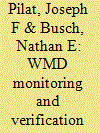

|
|
|
|
|
| Publication |
2011.
|
| Summary/Abstract |
In the years following the 2003 invasion of Iraq, there emerged a generally accepted view that the US government misinterpreted, or even deliberately misconstrued, the intelligence on Iraqi weapons of mass destruction (WMD) and that, in sharp contrast, international monitoring and verification regimes correctly verified prior to the war that Iraq had no WMD and deterred Saddam Hussein from pursuing them. Critiques of international inspections tend to overstate their capabilities and the levels of confidence that inspection processes can give the international community in verifying weapons development and rollback claims. The Iraqi case is important for thinking about current and future monitoring and verification regimes, but important lessons are being overlooked - and the wrong lessons are being learned. A sober reassessment of the strengths and weaknesses of the monitoring and verification in Iraq provides important lessons for those dealing with difficult cases now and in the future.
|
|
|
|
|
|
|
|
|
|
|
|
|
|
|
|
|
|
|
|
|